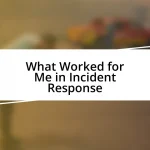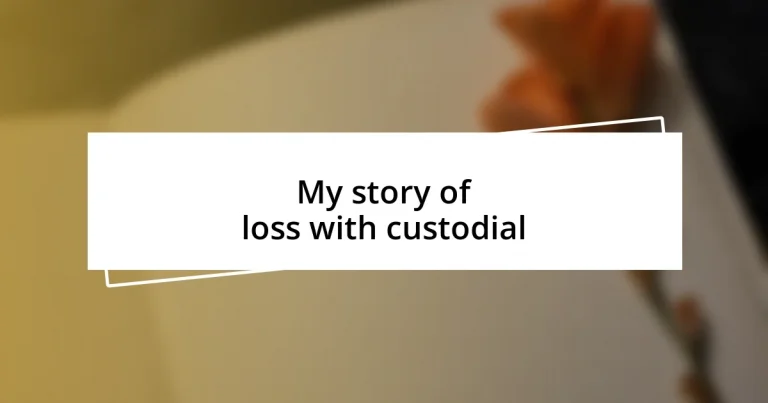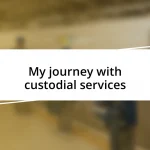Key takeaways:
- Grief is a non-linear journey, often manifesting through unexpected triggers and requiring individuals to redefine their sense of purpose and daily routines.
- Building a support network and sharing experiences with others who understand can provide comfort and foster genuine connections during the grieving process.
- Embracing self-compassion and mindfulness allows for a more meaningful healing journey, helping individuals navigate their emotions while celebrating the memories of loved ones.
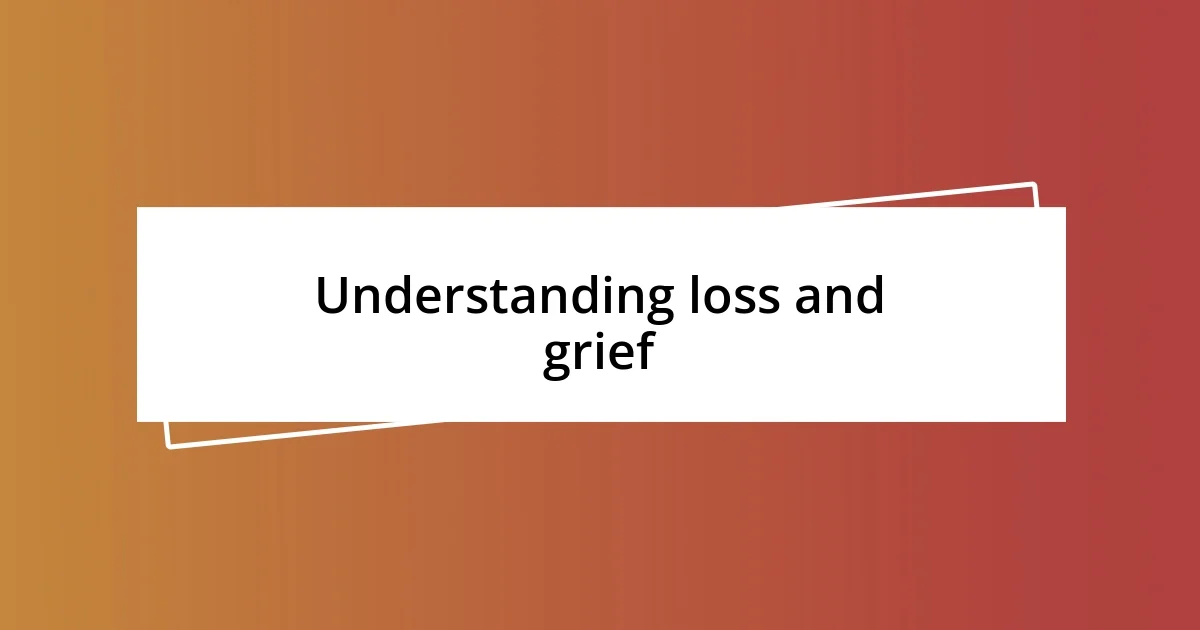
Understanding loss and grief
Loss is something that touches every one of us at some point, and understanding it can be incredibly challenging. When my grandmother passed away, I felt a deep emptiness. I often wondered, how could someone who had been such a pillar in my life suddenly be gone? That feeling, I realized, is part of the grieving process.
Navigating through grief isn’t linear; it ebbs and flows. I remember sitting alone in my room after my grandmother’s funeral, wrestling with feelings of anger and sadness that seemed to twist together like vines. It’s normal to question why these things happen. Those emotions can overpower, leaving us vulnerable and uncertain.
One thing I’ve learned is that grief can manifest in unexpected ways, sometimes at the most inconvenient moments. A simple song could transport me back to a memory shared with her, flooding me with tears when I least expected it. Have you experienced a similar rush of emotion? It’s a stark reminder that grief is not just about the loss; it’s about cherishing what was while learning to cope with the absence.
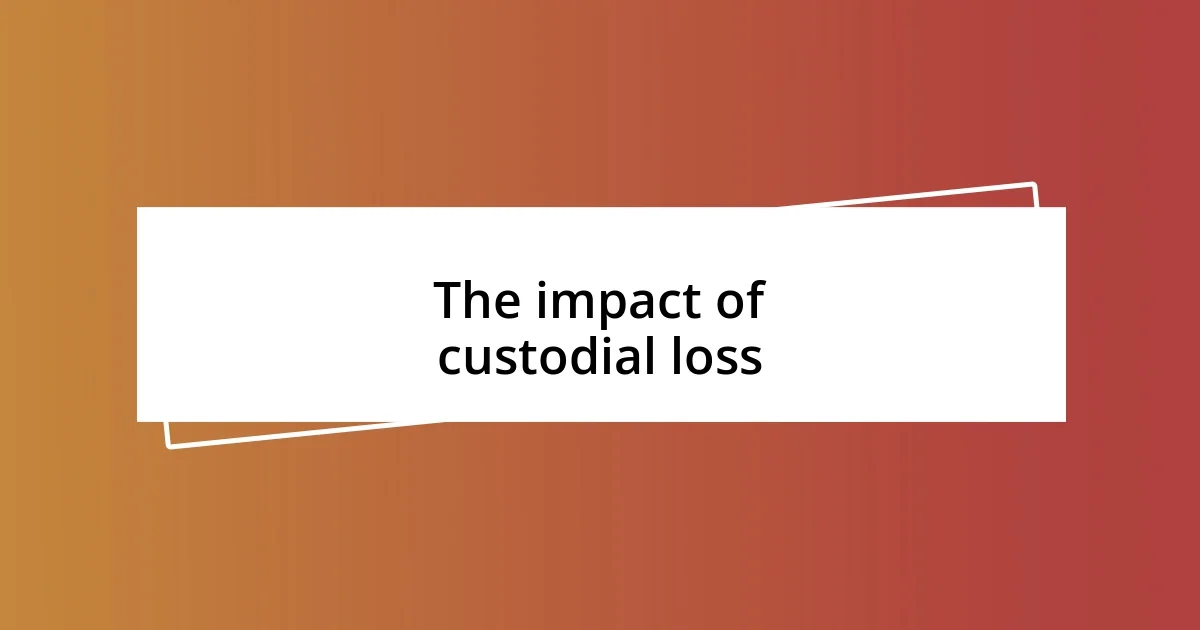
The impact of custodial loss
The impact of custodial loss can ripple through every aspect of life, often in ways we least anticipate. I remember when I lost my custodial role over my niece; it wasn’t just the absence of her laughter in my home that hit me hard, but also the stark realization that my daily routines were shattered. The way I had structured my life around her needs brought a profound sense of purpose, which left a gaping void when she wasn’t there.
Loss in this context is multifaceted—it’s not only emotional but also practical. Think about it: without the shared responsibilities of caregiving, I faced an unsettling newfound freedom that felt more isolating than liberating. I found myself asking questions like, “What do I do with all this time?” It was a jarring adjustment, one that forced me to redefine my daily life and purpose.
Financial implications are significant too, as the absence of custodial responsibilities can alter one’s budget and spending patterns. When I had custody, I was acutely aware of every expense related to her care—from food to education. Without that focus, I realized I had to reassess my financial priorities entirely, which added another layer of complexity to an already painful experience.
| Aspect | Impact |
|---|---|
| Emotional | Feelings of emptiness and loss of purpose |
| Practical | Need to redefine daily life and routines |
| Financial | Shifts in budgeting and spending habits |
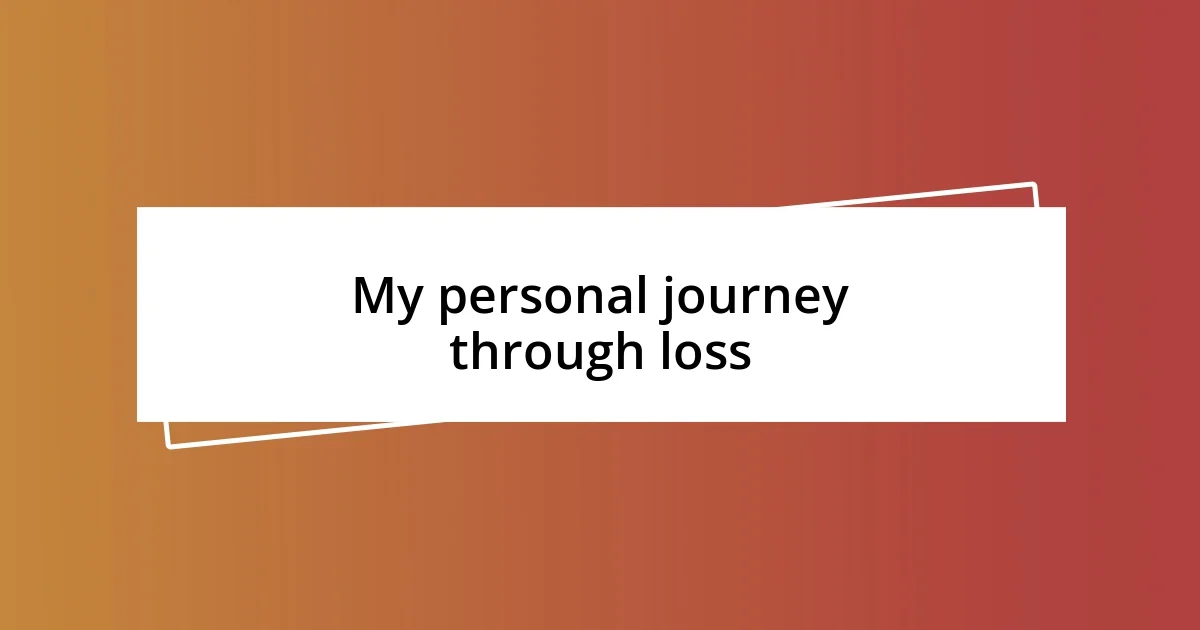
My personal journey through loss
Loss is a journey that can sometimes feel both disorienting and overwhelming. I remember the day my niece moved away; it was like watching the last light of day slip beneath the horizon. I sat in her empty room, searching for remnants of her vibrant spirit, but the silence was louder than I expected. The toys she played with, once full of laughter, now felt like relics of a life that had unraveled too quickly.
In grappling with this absence, I experienced a rollercoaster of emotions, often catching myself in the quiet moments of the day. Little things triggered memories—her favorite snack suddenly felt like a bitter reminder of her absence. I found myself longing for our routine of goofy dance parties and late-night story sessions. It was a bittersweet reminder of how deeply intertwined our lives had become. Below are some insights from my experience:
- Unexpected Triggers: It could be a song, a snack, or even a television show that would dredge up old memories, often at the most surprising moments.
- Revisiting Old Habits: I noticed myself trying to recreate our little rituals, only to realize it just wasn’t the same without her.
- Daily Life Impact: The small routines that once infused my day with joy were replaced by an eerie silence that lingered in the air.
- Reflections on Purpose: I often thought, “What do I do now?” as I faced the reality of having to redefine my purpose without her daily presence.
As I navigated this path, I learned that grief is not only about mourning what we’ve lost; it’s about the ongoing journey of rediscovering ourselves amid that loss. Each day presents a new challenge, yet it’s also an opportunity to reflect on the love that remains, hidden within our memories.
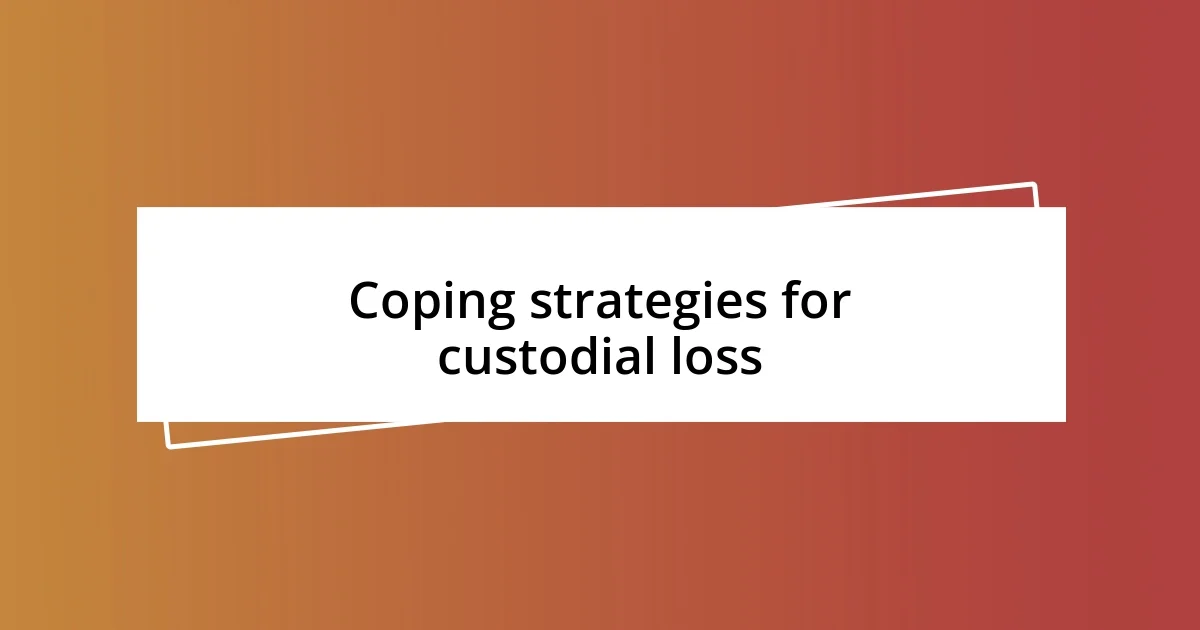
Coping strategies for custodial loss
Coping with custodial loss can be overwhelming, but I found solace in creating a structured routine that incorporated both my grief and my healing. Establishing small daily rituals, like morning coffee while reflecting on our memories, became my way of honoring her presence. Have you ever tried focusing on the moments that brought you joy, even when they feel bittersweet?
Reaching out to supportive friends and family played a crucial role in my journey. I remember countless evenings spent sharing stories about my niece, which helped me feel connected to her spirit and reminded me I wasn’t alone in my sorrow. Opening up about such a painful experience can be daunting, but it’s often in those shared moments that we find comfort and understanding.
I also discovered the power of creative expression as a way to process my emotions. Writing letters to her or channeling my sadness into art allowed me to articulate feelings that were too heavy to voice outright. Have you ever noticed how creative outlets can transform pain into something tangible? For me, it became a therapeutic release, helping me navigate the complexities of my loss while keeping her memory alive.
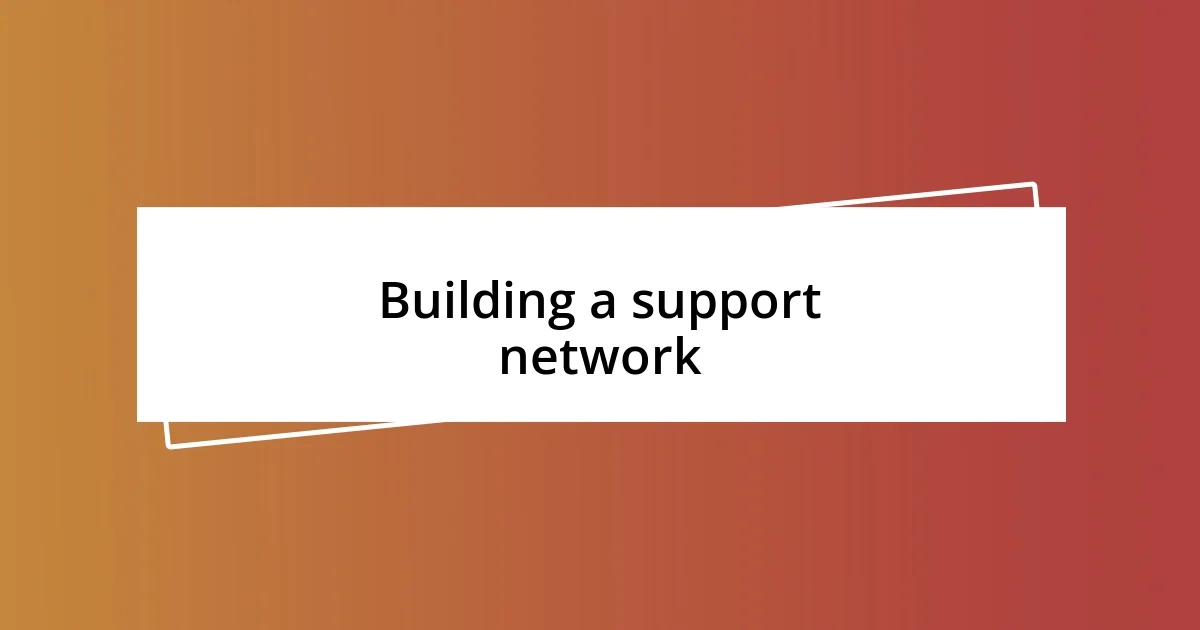
Building a support network
Building a support network has been essential in my journey through loss. When I found myself struggling with the emptiness after my niece left, I quickly realized I couldn’t shoulder the burden alone. I reached out to friends, and it surprised me how many people were willing to lend an ear. Have you ever felt that surge of relief when someone simply listens? Sharing my feelings became a lifeline, reminding me that I had a community ready to catch me when I stumbled.
I also took the step to connect with others who had faced similar losses. This meant attending support groups where I discovered not only understanding but a sense of belonging. Listening to their stories, I recognized fragments of my own pain and, in turn, felt seen and validated. It’s comforting to know that there are others who understand your grief without the need for explanation. Have you thought about how shared experiences can lighten the load of sorrow? For me, it was eye-opening to recognize that healing could happen collectively.
Building trust within this network took time, but it became vital in navigating my emotions. I remember one late evening when I called a friend, and despite my hesitation to burden her, she reassured me that my pain mattered. That moment crystallized what I believe: being open about our struggles enables us to forge genuine connections. I began to understand that forming a support network isn’t just about seeking help; it’s also about creating a space where vulnerability can thrive and healing can take root.
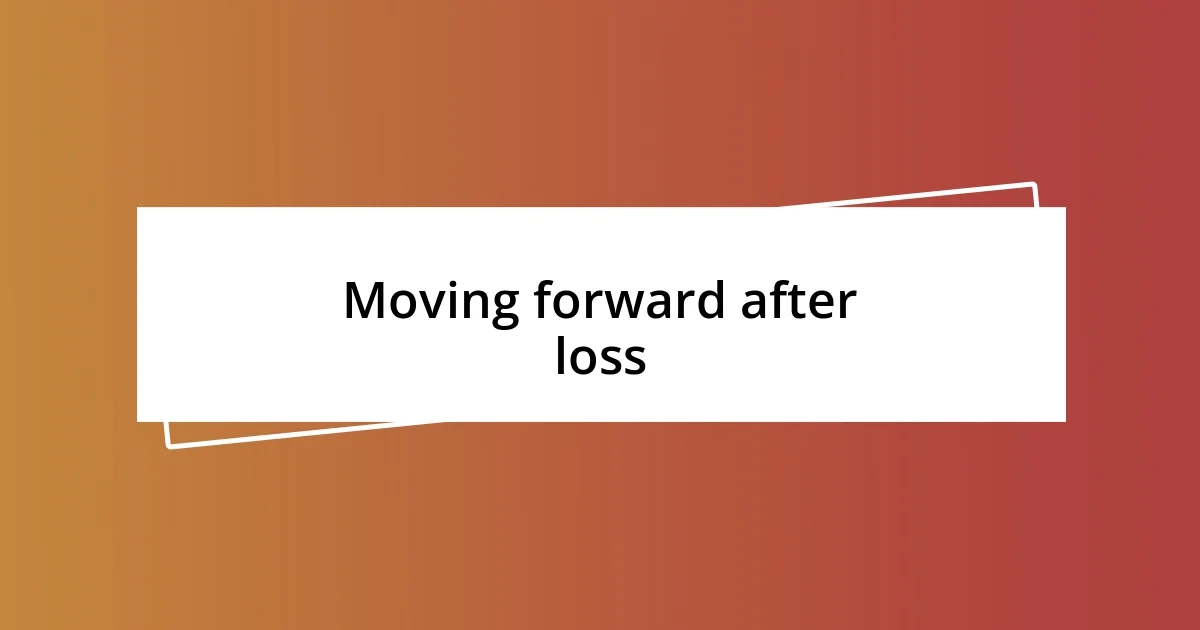
Moving forward after loss
Moving forward after loss is undoubtedly a challenging journey. I found that focusing on small milestones became essential for my healing. For instance, I committed to setting aside a few moments each week to look through old photos of my niece. It was a bittersweet experience, but it helped me appreciate the beautiful moments we shared while reminding me that her memory would always be a part of my life. Have you experienced a similar connection to your past as a source of strength?
Finding new ways to celebrate loved ones can also be incredibly healing. After my niece’s passing, I took it upon myself to engage in activities she enjoyed—like baking her favorite cookies. Each time I mixed the ingredients, I felt a warmth in doing something that connected me to her joy. It’s curious how simple joys can transform grief into a celebration of life. Have you ever tried this approach to keep someone’s spirit alive?
Another significant step was embracing the concept of self-compassion. Initially, I was hard on myself for not moving forward as quickly as I wanted. I learned to acknowledge my feelings instead of rushing through them, which allowed me to experience pain and hope side by side. Have you ever realized that it’s okay to take your time in the healing process? Accepting this helped me cultivate patience and gratitude for my journey, transforming each step into a meaningful part of my life story.
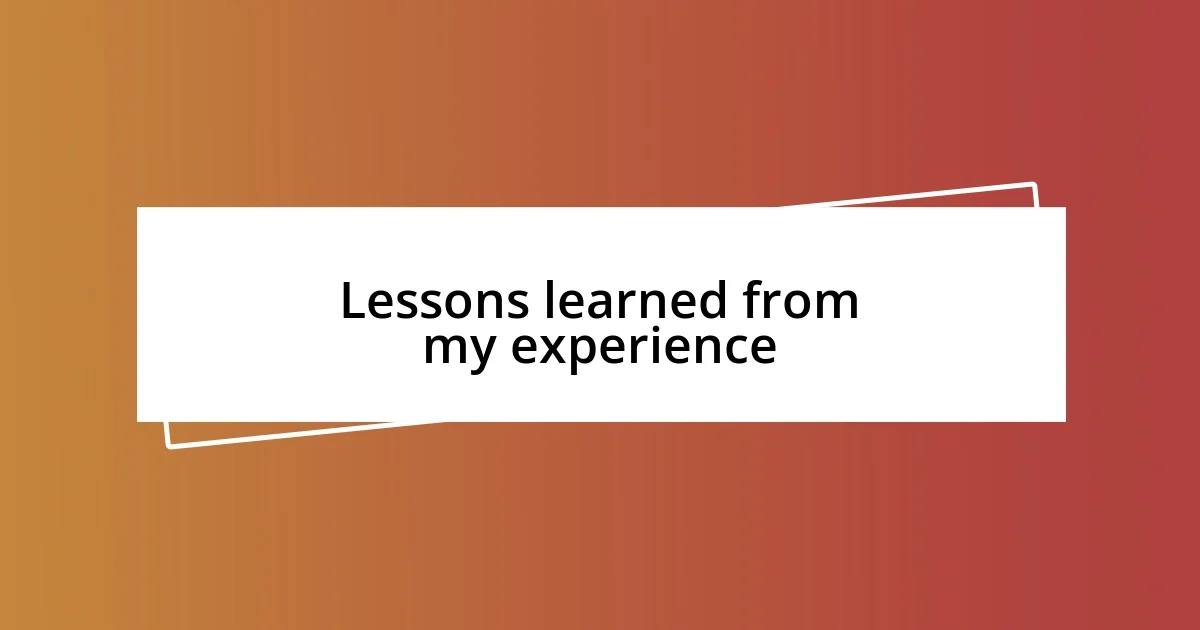
Lessons learned from my experience
I’ve discovered that grief can be a great teacher if we let it. One of the biggest lessons for me was realizing the importance of allowing myself to experience the full spectrum of emotions. Early on, I slipped into the habit of suppressing my feelings, thinking it would make things easier. But I learned that embracing sadness actually opened doors to joy. Have you ever found that recognizing your pain allows space for healing? For me, it was empowering to know that vulnerability doesn’t equate to weakness; it’s a brave step towards acceptance.
Another key insight was understanding the value of memories and how they shape our ongoing connection to those we’ve lost. I found solace in preserving cherished moments through a scrapbook dedicated to my niece. Each page became a tribute, weaving together laughter, lessons, and love. Have you ever created something to honor a loved one? This act transformed my grief into a creative outlet, reminding me that as long as I remember her, she lives on in my heart.
Finally, I learned the significance of being present. One day, while mindlessly scrolling through my phone, I caught a glimpse of sunlight streaming through the window. It struck me how easy it is to miss the beauty in everyday moments when dwelling on loss. I decided to practice mindfulness, taking intentional pauses to absorb my surroundings. Have you ever stopped to appreciate a simple moment? These small acts of awareness helped me cultivate gratitude and shifted my perspective on life, reminding me that there’s still beauty to be found amid the sorrow.


